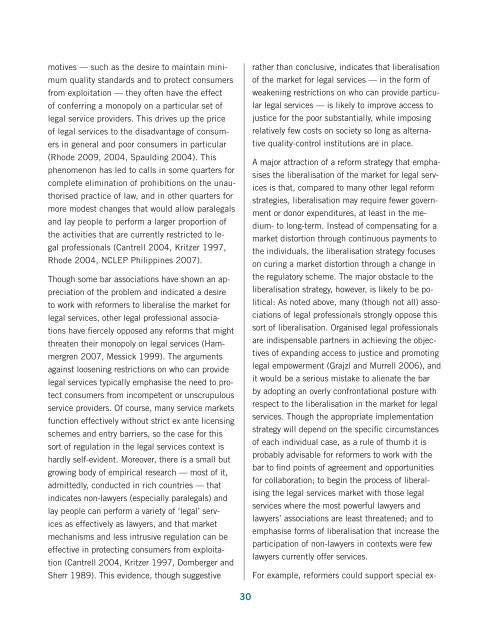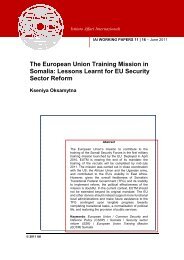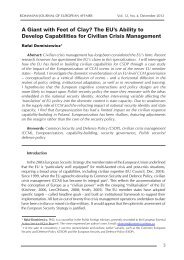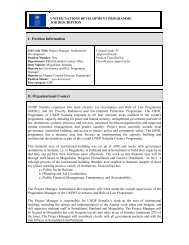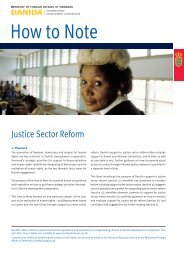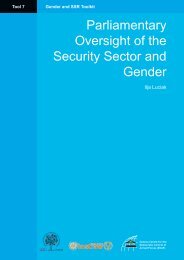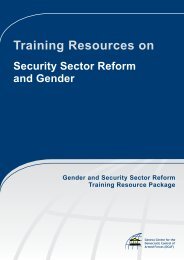Making The Law Work for Everyone Commission on Legal ... - ISSAT
Making The Law Work for Everyone Commission on Legal ... - ISSAT
Making The Law Work for Everyone Commission on Legal ... - ISSAT
Create successful ePaper yourself
Turn your PDF publications into a flip-book with our unique Google optimized e-Paper software.
motives — such as the desire to maintain minimumquality standards and to protect c<strong>on</strong>sumersfrom exploitati<strong>on</strong> — they often have the effectof c<strong>on</strong>ferring a m<strong>on</strong>opoly <strong>on</strong> a particular set oflegal service providers. This drives up the priceof legal services to the disadvantage of c<strong>on</strong>sumersin general and poor c<strong>on</strong>sumers in particular(Rhode 2009, 2004, Spaulding 2004). Thisphenomen<strong>on</strong> has led to calls in some quarters <str<strong>on</strong>g>for</str<strong>on</strong>g>complete eliminati<strong>on</strong> of prohibiti<strong>on</strong>s <strong>on</strong> the unauthorisedpractice of law, and in other quarters <str<strong>on</strong>g>for</str<strong>on</strong>g>more modest changes that would allow paralegalsand lay people to per<str<strong>on</strong>g>for</str<strong>on</strong>g>m a larger proporti<strong>on</strong> ofthe activities that are currently restricted to legalprofessi<strong>on</strong>als (Cantrell 2004, Kritzer 1997,Rhode 2004, NCLEP Philippines 2007).Though some bar associati<strong>on</strong>s have shown an appreciati<strong>on</strong>of the problem and indicated a desireto work with re<str<strong>on</strong>g>for</str<strong>on</strong>g>mers to liberalise the market <str<strong>on</strong>g>for</str<strong>on</strong>g>legal services, other legal professi<strong>on</strong>al associati<strong>on</strong>shave fiercely opposed any re<str<strong>on</strong>g>for</str<strong>on</strong>g>ms that mightthreaten their m<strong>on</strong>opoly <strong>on</strong> legal services (Hammergren2007, Messick 1999). <str<strong>on</strong>g>The</str<strong>on</strong>g> argumentsagainst loosening restricti<strong>on</strong>s <strong>on</strong> who can providelegal services typically emphasise the need to protectc<strong>on</strong>sumers from incompetent or unscrupulousservice providers. Of course, many service marketsfuncti<strong>on</strong> effectively without strict ex ante licensingschemes and entry barriers, so the case <str<strong>on</strong>g>for</str<strong>on</strong>g> thissort of regulati<strong>on</strong> in the legal services c<strong>on</strong>text ishardly self-evident. Moreover, there is a small butgrowing body of empirical research — most of it,admittedly, c<strong>on</strong>ducted in rich countries — thatindicates n<strong>on</strong>-lawyers (especially paralegals) andlay people can per<str<strong>on</strong>g>for</str<strong>on</strong>g>m a variety of ‘legal’ servicesas effectively as lawyers, and that marketmechanisms and less intrusive regulati<strong>on</strong> can beeffective in protecting c<strong>on</strong>sumers from exploitati<strong>on</strong>(Cantrell 2004, Kritzer 1997, Domberger andSherr 1989). This evidence, though suggestiverather than c<strong>on</strong>clusive, indicates that liberalisati<strong>on</strong>of the market <str<strong>on</strong>g>for</str<strong>on</strong>g> legal services — in the <str<strong>on</strong>g>for</str<strong>on</strong>g>m ofweakening restricti<strong>on</strong>s <strong>on</strong> who can provide particularlegal services — is likely to improve access tojustice <str<strong>on</strong>g>for</str<strong>on</strong>g> the poor substantially, while imposingrelatively few costs <strong>on</strong> society so l<strong>on</strong>g as alternativequality-c<strong>on</strong>trol instituti<strong>on</strong>s are in place.A major attracti<strong>on</strong> of a re<str<strong>on</strong>g>for</str<strong>on</strong>g>m strategy that emphasisesthe liberalisati<strong>on</strong> of the market <str<strong>on</strong>g>for</str<strong>on</strong>g> legal servicesis that, compared to many other legal re<str<strong>on</strong>g>for</str<strong>on</strong>g>mstrategies, liberalisati<strong>on</strong> may require fewer governmentor d<strong>on</strong>or expenditures, at least in the medium-to l<strong>on</strong>g-term. Instead of compensating <str<strong>on</strong>g>for</str<strong>on</strong>g> amarket distorti<strong>on</strong> through c<strong>on</strong>tinuous payments tothe individuals, the liberalisati<strong>on</strong> strategy focuses<strong>on</strong> curing a market distorti<strong>on</strong> through a change inthe regulatory scheme. <str<strong>on</strong>g>The</str<strong>on</strong>g> major obstacle to theliberalisati<strong>on</strong> strategy, however, is likely to be political:As noted above, many (though not all) associati<strong>on</strong>sof legal professi<strong>on</strong>als str<strong>on</strong>gly oppose thissort of liberalisati<strong>on</strong>. Organised legal professi<strong>on</strong>alsare indispensable partners in achieving the objectivesof expanding access to justice and promotinglegal empowerment (Grajzl and Murrell 2006), andit would be a serious mistake to alienate the barby adopting an overly c<strong>on</strong>fr<strong>on</strong>tati<strong>on</strong>al posture withrespect to the liberalisati<strong>on</strong> in the market <str<strong>on</strong>g>for</str<strong>on</strong>g> legalservices. Though the appropriate implementati<strong>on</strong>strategy will depend <strong>on</strong> the specific circumstancesof each individual case, as a rule of thumb it isprobably advisable <str<strong>on</strong>g>for</str<strong>on</strong>g> re<str<strong>on</strong>g>for</str<strong>on</strong>g>mers to work with thebar to find points of agreement and opportunities<str<strong>on</strong>g>for</str<strong>on</strong>g> collaborati<strong>on</strong>; to begin the process of liberalisingthe legal services market with those legalservices where the most powerful lawyers andlawyers’ associati<strong>on</strong>s are least threatened; and toemphasise <str<strong>on</strong>g>for</str<strong>on</strong>g>ms of liberalisati<strong>on</strong> that increase theparticipati<strong>on</strong> of n<strong>on</strong>-lawyers in c<strong>on</strong>texts were fewlawyers currently offer services.For example, re<str<strong>on</strong>g>for</str<strong>on</strong>g>mers could support special ex-30


